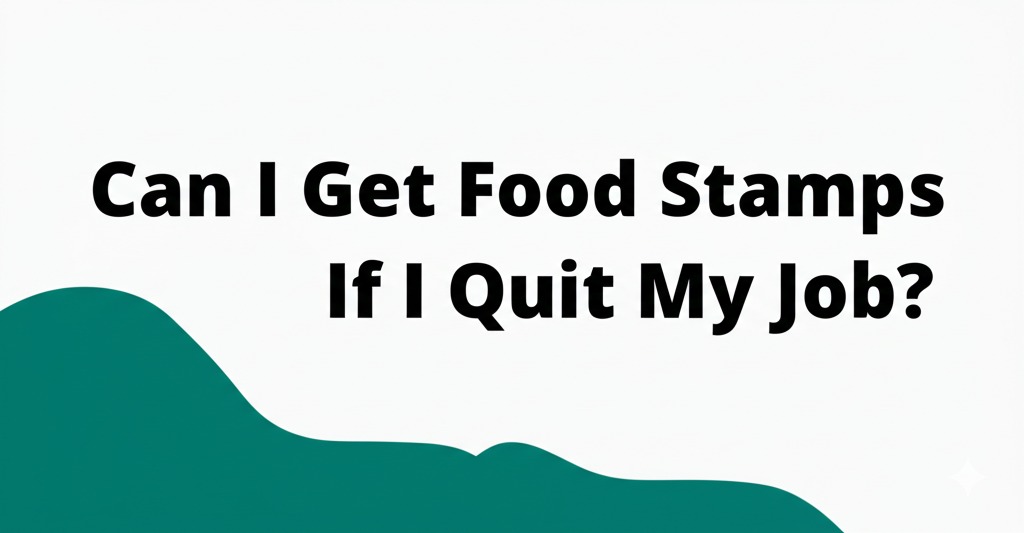
In times of financial uncertainty, it’s not uncommon to wonder about your eligibility for public assistance programs like food stamps (now known as the Supplemental Nutrition Assistance Program or SNAP). But what if you voluntarily quit your job? Will quitting disqualify you from receiving benefits? In this article, we’ll answer this question, explore how SNAP works, and provide important information about the eligibility criteria, exceptions, and potential consequences of quitting your job. Whether you’re facing a difficult situation or just want to understand the system better, this guide is here to help.
Understanding SNAP Benefits
What Is SNAP?
The Supplemental Nutrition Assistance Program (SNAP) is a government assistance program that helps low-income individuals and families purchase nutritious food. It is designed to provide financial relief to those in need, particularly when income is insufficient to cover basic necessities. SNAP benefits are issued through an Electronic Benefits Transfer (EBT) card, which can be used at authorized food retailers.
How Do You Qualify for SNAP?
Eligibility for SNAP benefits depends on several factors, including:
- Income: Your household’s gross monthly income must fall below a certain threshold.
- Household Size: Larger households are generally allowed higher income levels.
- Assets: Some households must meet asset limits, though there are exceptions for certain types of property like your home or car.
- Work Requirements: Able-bodied adults between the ages of 18 and 49 must work or participate in a work program to receive SNAP benefits for more than three months in a three-year period.
Will Quitting My Job Affect My SNAP Eligibility?
Impact of Voluntarily Quitting a Job
The answer to this question is not straightforward. Generally, voluntarily quitting a job may affect your eligibility for SNAP benefits. This is because the program is designed to assist individuals who are struggling financially due to circumstances beyond their control, such as job loss due to layoffs or health issues. If you quit your job without a valid reason (as defined by the state), your eligibility for benefits may be temporarily disqualified.
Valid Reasons for Quitting a Job
However, there are some situations in which quitting a job may not automatically disqualify you from receiving food stamps. If you quit for a valid reason, such as:
- Health Issues: If you had to leave your job due to a medical condition or disability, you may still be eligible for benefits.
- Unsafe Work Environment: If you left a job because the work environment was unsafe, you may qualify for SNAP.
- Family Emergencies: If you had to quit to take care of a sick family member, some states may consider this a valid reason.
State-Specific Policies
Each state administers the SNAP program differently, which means eligibility rules and exceptions may vary. Some states may be more lenient about those who voluntarily quit their jobs, while others may impose stricter requirements. It’s crucial to contact your local SNAP office to understand the specific rules that apply to you.
Can I Get Food Stamps If I Quit and Have No Job?
Work Requirements for Able-Bodied Adults Without Dependents (ABAWDs)
If you are an able-bodied adult without dependents (ABAWD), you must meet certain work requirements to receive SNAP benefits. If you quit your job and do not find a new one, you may only be eligible for SNAP for up to three months in a three-year period, unless you meet specific exemptions.
These exemptions include:
- Being pregnant or caring for a child under 18.
- Being mentally or physically unfit to work.
- Participating in an approved work or training program.
Without meeting these requirements, you may be cut off from benefits after three months of unemployment.
Are There Any Exceptions for People Who Quit Their Jobs?
Exceptions to the Rule
While quitting your job may usually impact your eligibility, there are exceptions. These may include:
- Good Cause for Leaving a Job: If you can demonstrate a valid reason for quitting, such as health problems, family obligations, or unsafe working conditions, you may still be eligible for food stamps.
- Exemptions for Parents and Caregivers: If you are a primary caregiver for children or someone with disabilities, you may not be subject to the same work requirements as other adults.
- Temporary Assistance for Needy Families (TANF): If you qualify for TANF, you may be able to receive additional support even if you have quit your job.
Each state has its own criteria and application process, so it’s essential to check with your local office to clarify whether you might qualify under an exception.
How to Apply for SNAP Benefits
The Application Process
Applying for SNAP benefits involves several steps:
- Check Your Eligibility: Visit your state’s SNAP website or call your local office to see if you meet the eligibility requirements.
- Fill Out the Application: You’ll need to provide detailed information about your income, household size, and any assets.
- Provide Documentation: Be prepared to provide proof of your income, identity, and living situation.
- Interview: You may need to participate in an interview with a caseworker who will review your application and eligibility.
- Wait for Approval: After your application is reviewed, you’ll receive a decision on your eligibility. If approved, your benefits will be issued via an EBT card.
Conclusion: Can You Get Food Stamps After Quitting Your Job?
In conclusion, the answer to whether you can get food stamps after quitting your job depends on a variety of factors, including the reason for quitting and your specific state’s rules. While quitting without a valid reason may reduce or eliminate your eligibility for SNAP, valid reasons such as health problems or family emergencies may still allow you to receive benefits.
If you’re facing a difficult financial situation after quitting your job, it’s important to reach out to your local SNAP office to learn more about your options. The application process can be complex, but understanding your rights and options can make a significant difference in accessing the support you need. If you believe you qualify, don’t hesitate to apply for assistance and get the help that could make your next steps easier.

Andre Cuevas provides career insights, job search strategies, and professional advice to help individuals navigate the job market and achieve their career goals.





